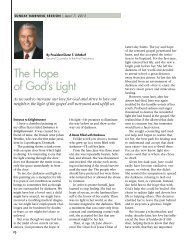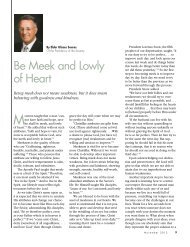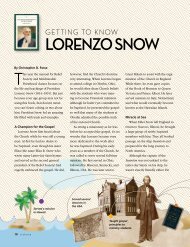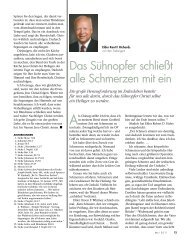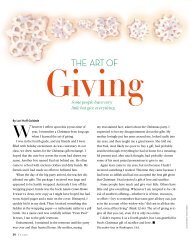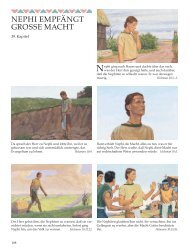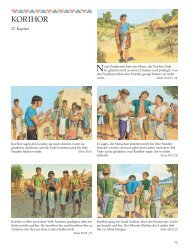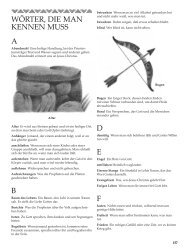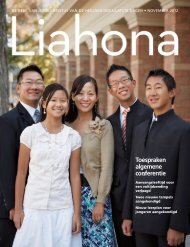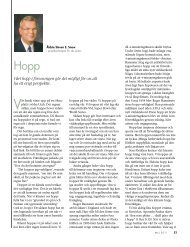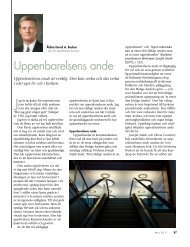August 2006 Ensign - The Church of Jesus Christ of Latter-day Saints
August 2006 Ensign - The Church of Jesus Christ of Latter-day Saints
August 2006 Ensign - The Church of Jesus Christ of Latter-day Saints
Create successful ePaper yourself
Turn your PDF publications into a flip-book with our unique Google optimized e-Paper software.
28<br />
President Gordon B. Hinckley<br />
described coveting as the “trap that<br />
can destroy any <strong>of</strong> us in our search for<br />
joy and happiness. It is that devious,<br />
sinister, evil influence that says, ‘What I<br />
have is not enough. I must have more.’ ” 2<br />
Principle 2: Work.<br />
When Adam and Eve<br />
left the Garden <strong>of</strong> Eden,<br />
they needed to work if they<br />
wanted to eat. Further, they<br />
were promised that making a<br />
living would be hard work<br />
(see Genesis 3:19).<br />
Principle 4: Increase financial<br />
<strong>The</strong> world places great emphasis on<br />
knowledge.<br />
leisure and retirement. Lifelong work,<br />
<strong>The</strong> parable <strong>of</strong> the talents teaches us<br />
however, is ordained <strong>of</strong> God and is neces-<br />
that we have a sacred obligation to be<br />
sary for our growth and salvation. While<br />
wise stewards <strong>of</strong> the financial resources<br />
we may retire from our financial employ-<br />
with which we have been blessed, be they<br />
ment, we cannot retire from God’s plan<br />
few or vast. We are judged not by how<br />
<strong>of</strong> life for His children.<br />
much we have but by what we do with<br />
what we have. <strong>The</strong> servant who increased<br />
Principle 3: Don’t covet the<br />
his talents from five to ten and the servant<br />
possessions <strong>of</strong> others.<br />
who increased his talents from two to four<br />
<strong>The</strong> last <strong>of</strong> the Ten Commandments<br />
received the same reward; the Lord told<br />
given to Moses was “Thou shalt not<br />
both: “Well done, thou good and faithful<br />
covet” (Exodus 20:17). During His mortal<br />
servant: thou hast been faithful over a few<br />
ministry, <strong>Christ</strong> reemphasized this commandment when things, I will make thee ruler over many things” (Matthew<br />
he told the multitude to “take heed, and beware <strong>of</strong> cov- 25:21; see also v. 23).<br />
etousness” (Luke 12:15).<br />
Sometimes it seems we are bombarded with financial<br />
Elder Joseph B. Wirthlin <strong>of</strong> the Quorum <strong>of</strong> the Twelve advice from many different sources, even trusted friends<br />
Apostles has taught that covetousness “is one <strong>of</strong> the great or loved ones. I would not suggest that all <strong>of</strong> this advice<br />
afflictions <strong>of</strong> these latter <strong>day</strong>s. It creates greed and resent- is necessarily wrong, but it may be incomplete or based<br />
ment. Often it leads to bondage, heartbreak, and crushing, on the philosophies <strong>of</strong> men, or it simply may not apply<br />
grinding debt.” in every situation. We must learn to recognize our own<br />
1<br />
When Adam and Eve left the<br />
Garden <strong>of</strong> Eden, they needed<br />
to work if they wanted to eat.<br />
Further, they were promised<br />
that making a living would<br />
be hard work.<br />
LEFT: ADAM AND EVE DRIVEN OUT OF EDEN; RIGHT: MOSES COMING DOWN FROM MOUNT SINAI, BOTH BY GUSTAVE DORÉ



